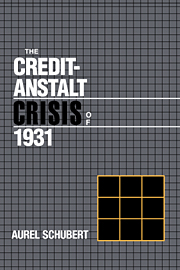Book contents
- Frontmatter
- Contents
- Tables
- Preface
- The Credit-Anstalt Crisis of 1931
- 1 Introduction
- 2 Diary of the crisis
- 3 Financial crisis theories and the Austrian experience of 1931
- 4 The causes of the financial crisis
- 5 The financial crisis and market efficiency
- 6 The financial crisis and economic activity
- 7 The financial crisis and the lender of last resort
- 8 Alternative policies and policy implications
- 9 Conclusions
- Bibliography
- Index
5 - The financial crisis and market efficiency
Published online by Cambridge University Press: 20 March 2010
- Frontmatter
- Contents
- Tables
- Preface
- The Credit-Anstalt Crisis of 1931
- 1 Introduction
- 2 Diary of the crisis
- 3 Financial crisis theories and the Austrian experience of 1931
- 4 The causes of the financial crisis
- 5 The financial crisis and market efficiency
- 6 The financial crisis and economic activity
- 7 The financial crisis and the lender of last resort
- 8 Alternative policies and policy implications
- 9 Conclusions
- Bibliography
- Index
Summary
In Europe, where the problem is mainly one of nerves, the psychological is nearly always the most important aspect of whatever takes place.
–The Contemporary Review, May 1931We have shown that the Austrian experience of 1931 constituted a true financial crisis and was not just a pseudocrisis. Historic accounts stress very clearly the fact that the markets were surprised by the outbreak of the crisis – or, better, the crises. If this observation happens to be correct – in spite of the fact that crises of this magnitude need time to develop – then we would have to reject market efficiency for this episode. Not all the available information was incorporated into market behavior. Such evidence differs from the results of the vast majority of empirical studies of the behavior of stock markets, foreign exchange markets, bond markets, commodity futures markets, etc.
We recall from above that it was not a single crisis that occurred in Austria in 1931, but a bank failure, a banking crisis, and a currency crisis. Therefore, when we investigate whether the market predicted the crisis, we really have to ask this question separately for the different aspects of the crisis. Two episodes in particular, namely the Credit-Anstalt failure and the currency crisis, should have been reflected in market behavior before the actual events occurred. The stock market and the foreign exchange market are then the main objects of our investigations.
- Type
- Chapter
- Information
- The Credit-Anstalt Crisis of 1931 , pp. 65 - 97Publisher: Cambridge University PressPrint publication year: 1992



